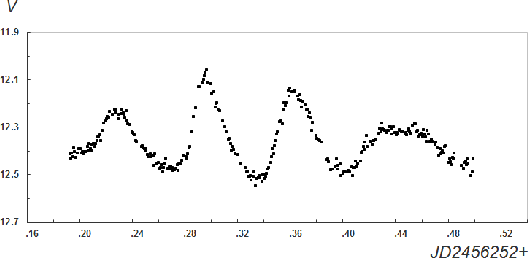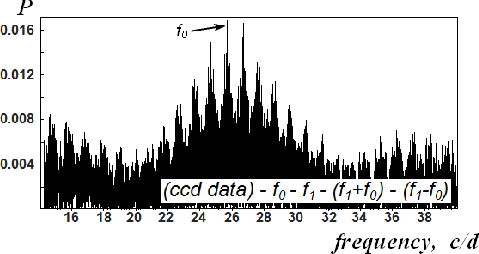|
Peremennye Zvezdy (Variable Stars) 33, No. 6, 2013 Received 11 July; accepted 17 July.
|
Article in PDF |
A Photometric Study of the Pulsating Variable Star TYC 0075 01143 1
A.V. Khruslov1, A.V. Kusakin2
- Institute of Astronomy, Russian Academy of Sciences,
Moscow, Russia, e-mail: khruslov@bk.ru;
- Fesenkov Astrophysical Institute, Almaty, Kazakhstan, e-mail: un7gbd@gmail.com
|
We present the results of our new observations of TYC
0075 01143 1, a recently discovered double-mode |
1. Introduction
In this paper, we present the results of our study of a multiple-periodicity
Variability of TYC 0075 01143 1 = ASAS 042606+0126.4 was detected
in the ASAS-3 project (Pojmanski 2002). In the ASAS catalog, the
classification of the variable is EC/DSCT (a contact eclipsing
binary or a ![]() Scuti variable); a period
Scuti variable); a period
![]() is
also given there. Kruslov (2011) confirmed that TYC 0075 01143 1
belonged to
is
also given there. Kruslov (2011) confirmed that TYC 0075 01143 1
belonged to ![]() Scuti stars; he also detected the double-mode
character of brightness variations and suggested the following
light elements:
Scuti stars; he also detected the double-mode
character of brightness variations and suggested the following
light elements:
Preliminary results from our new CCD observations were published
by Khruslov et al. (2012). In the present paper, we use a much
longer series of observations that made it possible to detect new
interaction frequencies and a possible nonradial frequency, ![]() .
.
2. Observations
We acquired new CCD observations of TYC 0075 01143 1. Our observations were performed at the Tien Shan Astronomical Observatory of the V.G. Fesenkov Astrophysical Institute, at the altitude of 2750 m above the sea level, using a Ritchey-Chretien telescope designed by V.B. Sekirov. The telescope's mirror diameter is 360 mm, the focal length of the system being 1440 mm. The detector was an ST-402 SBIG CCD camera. The observations were made on 11 nights between December 17, 2011 and November 20, 2012 (JD 2455913-2456252); in total, we obtained 1718 brightness estimates. All frames had 60-second exposure times in Johnson's
The finding chart (Fig. 1) identifies the variable star,
comparison star, and check star. The comparison star was GSC
00075-01862 and the check star, GSC 00075-01079. The magnitudes
of these stars in the GSC2.3 catalog are respectively ![]() and
and ![]() .
.
Our observations are available online in the html version of this paper.
3. Results
We analyzed the time series using Deeming's method implemented in the WinEfk code written by V.P. Goranskij. Using our new observations of TYC 0075 01143 1, we improved the frequencies| Mode | Frequency, c/d | Period, days | Epoch, HJD | |
| mag | ||||
|
|
13.435398 | 0.126 | 0.07443025 | 2456100.0083 |
|
|
17.270241 | 0.074 | 0.05790307 | 2456100.0133 |
|
|
30.70565 | 0.024 | 0.0325673 | 2456100.0084 |
|
|
3.834915 | 0.016 | 0.260762 | 2456100.017 |
|
|
25.68687 | 0.016 | 0.0389304 | 2456100.0065 |
The light curves of TYC 0075 01143 1 are displayed in Fig. 2. The
![]() -band range of TYC 0075 01143 1 is
-band range of TYC 0075 01143 1 is
![]() . The
period ratio
. The
period ratio
![]() is typical of high-amplitude
double-mode
is typical of high-amplitude
double-mode ![]() Scuti stars radially pulsating in the
fundamental and first overtone modes (Petersen &
Christensen-Dalsgaard 1996).
Scuti stars radially pulsating in the
fundamental and first overtone modes (Petersen &
Christensen-Dalsgaard 1996).
 |
Fig. 2. The light curves of TYC 0075 01143 1. Upper panels: raw data; lower panels: the folded light curves with the other variation pre-whitened. |
Along with the light curves, we present power spectra of TYC 0075
01143 1, for the raw data and after subtraction of the
fundamental-mode oscillations (see Fig. 3). Figure 4 exhibits
light-curve variations from one cycle to another during the same
night, typical of high-amplitude double-mode ![]() Scuti
variables.
Scuti
variables.
The frequency ![]() is identified rather reliably, its amplitude
is close to that for the frequency
is identified rather reliably, its amplitude
is close to that for the frequency ![]() . The structure of the
power spectra (Fig. 5) leaves no doubt that
. The structure of the
power spectra (Fig. 5) leaves no doubt that ![]() is a real
frequency. However, we cannot completely rule out that the real
frequency is a one-day alias of the tabulated
is a real
frequency. However, we cannot completely rule out that the real
frequency is a one-day alias of the tabulated ![]() , namely
, namely
![]() (the corresponding period being
0
(the corresponding period being
0![]() 0374673).
0374673).
Acknowledgements: The authors are grateful to Dr. V.P. Goranskij for providing software for the light-curve analysis. We wish to thank M.A. Krugov for technical assistance during the observations and Dr. N.N. Samus for helpful discussions. This study was supported by the Russian Foundation for Basic Research and by the Programme "Non-stationary Phenomena of Objects in the Universe" of the Presidium of Russian Academy of Sciences.
 |
Fig. 4. Observations of TYC 0075 01143 1 acquired during a single night of November 20, 2012 (JD 2456252). |
 |
Fig. 5.
The power spectrum for the frequency |
References:
Khruslov, A.V. 2011, PZP, 11, 30
Khruslov, A.V., Samus, N.N., Kokumbaeva, R.I., Kusakin, A.V. 2012, Communications from the National Academy of Sciences of Kazakhstan, Physics and Mathematics Series, No. 3, 25
Petersen, J.O., Christensen-Dalsgaard, J. 1996, Astron. and Astrophys., 312, 463
Pojmanski, G., 2002, Acta Astronomica, 52, 397

